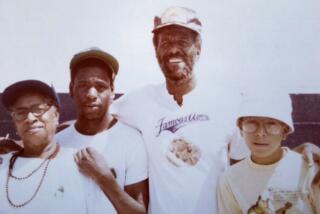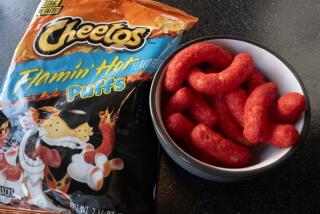P&G; Will Get $125 Million in Cookie Fight : 3 Rivals Settle Suit on Chewy Snack Patent
- Share via
This is the way the cookie crumbles for three competitors of Procter & Gamble Co.
Nabisco Brands Inc., Keebler Co. and Frito-Lay Inc. have agreed to pay the giant consumer products company $125 million to settle lawsuits alleging that they stole its idea for cookies with a crispy outside but a soft, chewy center.
It appears to be the largest payment ever reported as a settlement in patent litigation, Procter & Gamble, based in Cincinnati, said Tuesday in announcing the victory.
“We’ve worked hard to prove we’re right, and we won,” John E. Pepper, P&G;’s president, said in a statement.
P&G; entered the competitive ready-to-eat cookie business early in 1983, test-marketing its soft-center Duncan Hines cookies in Kansas City, Kan., and rolling them out to other areas the next year.
Competitors already in the cookie business quickly saturated the nation with their own similar products--Nabisco’s Almost Home, Keebler’s Soft Batch and Frito-Lay’s Grandma’s Rich ‘n Chewy.
Aerial Surveillance Claimed
In June, 1984, two P&G; researchers, Charles A. Hong and William J. Brabbs, were granted a patent on the cookie-making process for which they had applied in 1979. P&G; immediately sued rivals in U.S. District Court in Wilmington, Del.
In early court documents, now sealed, P&G; claimed that a Nabisco employee entered an area of a bakery where Duncan Hines cookies were being made, that Keebler flew a plane over a P&G; cookie-making plant under construction and that a Frito-Lay employee posed as a P&G; customer to attend a confidential sales presentation.
Under the agreement, signed by Chief Judge Joseph Longobardi, the rivals are prohibited from infringing on P&G;’s patent in the future. However, all three devised new formulas after the suits were filed, and products now on the market can still be sold.
The terms call for Nabisco, owned by RJR Nabisco, and Keebler, a unit of United Biscuits Holdings of London, to each pay $52.9 million. The portion for Frito-Lay, a division of PepsiCo, is $19.1 million. P&G; said the full amount will be credited as a one-time gain in its first quarter, which began July 1.
In preparation for trial, which was to have begun Oct. 2, lawyers took 120,000 pages of testimony from 200 witnesses over 2 1/2 years. Arrangements had been made to remove half the spectator seats in Longobardi’s court to accommodate file cabinets holding 10,000 exhibits.
‘A Big Disaster’
Despite its size, the settlement could be viewed as a Pyrrhic victory. P&G; now sells only three varieties of the cookies, down from 10 flavors in 1987. During the 1987 fourth quarter, it took a $435-million after-tax charge, much of which was connected with closing some cookie production plants.
Jerome G. Lee, senior partner with Morgan & Finneman, a New York patent law firm that represented P&G;, said the settlement amount “was considered acceptable as a vindication and gratification.”
“It’s got to make them feel a little better,” agreed Joseph H. Kozloff, an analyst with Drexel Burnham Lambert in New York. But, he added, P&G;’s cookie business has been “a big disaster.”
According to Advertising Age, a trade publication, soft-center cookies account for less than 10% of the $3.2-billion retail market for ready-to-eat cookies. Nabisco, the leader, also sells Chewy Chips Ahoy, introduced after the suits were filed.
More to Read
Inside the business of entertainment
The Wide Shot brings you news, analysis and insights on everything from streaming wars to production — and what it all means for the future.
You may occasionally receive promotional content from the Los Angeles Times.











